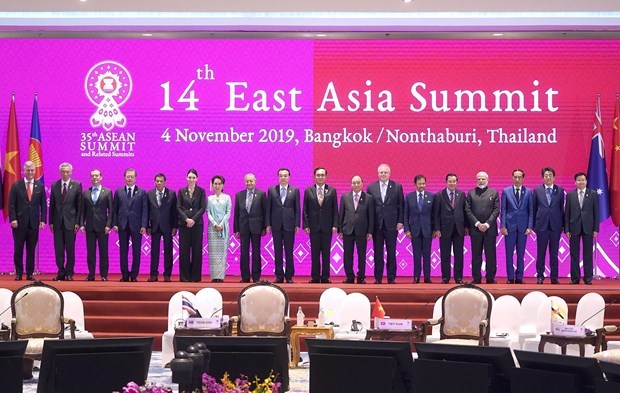 |
|
Leaders pose for a photo at the 14th East Asia Summit on November 4
|
Leaders of the participating countries said the EAS is a leading mechanism for dialogue on security and strategies in the region, noting that the world’s situation is witnessing complex and swift developments with advantages and challenges intertwined.
Most of them shared the view that the EAS, which covers half of the global population, must be consolidated and brought into play so as to truly become a forum for leaders to discuss issues relevant to regional peace and stability.
The countries expressed their satisfaction with the implementation of the Manila Plan of Action to Advance the Phnom Penh Declaration on the EAS Development Initiative (2018-2020), the adoption of the EAS leaders’ statement on cooperation to combat transnational crime, and the promotion of sustainable development.
They said the document of ASEAN Outlook on the Indo-Pacific has reflected ASEAN’s vision, principles and priorities in cooperation with partners. Meanwhile, the bloc’s partners expressed their hope for concrete cooperation activities to be carried out soon.
At the summit, leaders spent much time looking into the East Sea situation. Most of them called on parties concerned to exercise self-restraint, not complicate the situation, and respect international law, including the 1982 United Nations Convention on the Law of the Sea (UNCLOS).
They also underscored the importance of the full implementation of the Declaration on the Conduct of Parties in the East Sea (DOC), and of the early building of an efficient and effective Code of Conduct (COC) in the waters between ASEAN and China that is in line with international law, including the 1982 UNCLOS.
Addressing the event, PM Nguyen Xuan Phuc highlighted the significance of the EAS, a forum for leaders to dialogue and cooperate for the common goal of regional peace, stability and security.
He voiced his support for the EAS to foster the adherence to international law and promote the formation of standards of conduct and frameworks for rules-based relations among countries in the region.
The Vietnamese leader stated the East Sea situation has yet to be truly sustainable since there remain incidents that have stirred concern, run counter to international law, and may affect peace, stability, security, safety and freedom of navigation and aviation.
The PM asked countries to bolster dialogue, build trust, form and share standards of conduct, seriously implement the DOC, and build an efficient and effective COC that is in accordance with international law for a water body of peace, cooperation and prosperous development./.VNA
 The East Sea issue was among the focuses of the 14th East Asia Summit (EAS) on November 4 afternoon, part of the ongoing 35th ASEAN Summit and related summits in Thailand." itemprop="description" />
The East Sea issue was among the focuses of the 14th East Asia Summit (EAS) on November 4 afternoon, part of the ongoing 35th ASEAN Summit and related summits in Thailand." itemprop="description" />